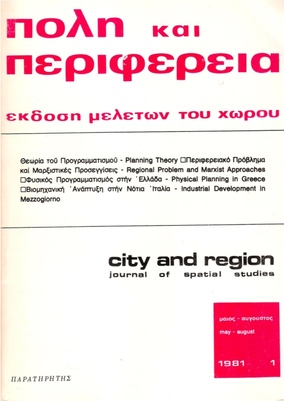Η θεωρία των πόλων ανάπτυξης και η εφαρμογή της στον γαλλικό περιφερειακό προγραμματισμό
Part of : Πόλη και περιφέρεια : έκδοση μελετών του χώρου ; No.6, 1983, pages 7-29
Issue:
Pages:
7-29
Parallel Title:
Growth-Pole Theory and its Application in French Regional Planning
Author:
Abstract:
The article is built around the critical understanding of the growth-pole concept on the one hand and the study of the experience gained from its application in French regional planning on the other. Three kinds of questions are seen as the most important axes for the presentation of the argument. 1. In what ways the regional problem is approached by growth-pole theory? The basic idea that growth appears to concentrate in a restricted number of poles or points in space seems to be empirically sound but the empirical and theoretical relevance to the Perrouxian concept of growth-pole based on "industrie-motrice" within economic space is not easily established. Spatial concentration certainly adds to the pull-power of an area by providing agglomeration advantages but this is neither necessary nor enough to create by itself a growth pole. Boudeville's "geographical" interpretation of growth-pole concept has led to serious misunderstandings of this kind that have directly affected French regional planning during the sustained growth period of late 50s and the 60s. Thus the idea of creating regional growth-centers had not been followed by trie development of their regions or zones of influence. In fact the creation of a supposedly key industry has led in certain cases to dependent development as the region was connected to internationally functioning fields of economic forces. As Richardson argues the geographical version of growth-pole theory has never achieved the status of a true theory because it leaves too many unanswered problems in relation to its field of intended applications. 2. What are the directions of the theory for regional planning? If theory is correct in its prescription that concentration of investments efforts in a limited number of poles is more effective then its*'advice"for regional planning becomes the creation of an hierarchical network of settlements of various sizes and specialisation. What is the criterion of success however: balanced regional development or the promotion of faster national growth rates? Theory itself does not provide satisfactory answers as it remains silent to the possibility of conflict between these two sets of goals. The practical answer that was given by French planners favoured increasing national competitiveness by creating poles only in peripheral regions with prospects of entering dynamically the European market while an oversized central area was left to the influence of Paris region. In addition to the above the theory favoured the creation of big industrial complexes and thus is became partially responsible for the well-known phenomenon of creating "cathedrals in the desert" as for example in southwest France.3. What is the role of staie intervention? The role of the state intervention emerges in the light of French regional planning as decisive in the orientation of the basic strategies for development. In this case it becomes clear that the amelioration of regional unevenness was among the aims of the state but it was not the criterion for the formation of its strategies. The creation of ««métropoles d* équilibre", of industrial complexes, of port complexes and the concentration of infrestructurai investments suggests that the state used public investment power for the creation of favourable conditions for selected private investments of big enterprises. However, the creation of national and international industrial champions might be a justified aim but its relation to the needs of regional development remains unspecified. Growth-pole theory is revealed as a means used by the state for the achievement of objectives defined in less subtle ways and with no particular sensitivity to theoretical considerations.
Subject:
Subject (LC):
Notes:
* Το κείμενο που ακολουθεί παρουσιάστηκε οτο «Σεμινάριο Πολεοδομίας-Χωροταξίας» της Έδρας Β' Πολεοδομίας της Πολυτεχνικής Σχολής του Α.Π.Θ. τον Φεβρουάριο του 1980 και κυκλοφόρησε στη σειρά Ερευνητικά Φυλλάδια της ίδιας Έδρας. Το κείμενο παρουσιάζεται εδώ με τις ελάχιστες αλλαγές που επιβάλλονται από το διαφορετικό πλαίσιο παρουσίασης του.
References (1):
- Allen, Κ. and MacLennan, M.C. (1970), Regional Problemi and Policies in Italy and France, London, George Aller and Unwin.Boudeville, J.-R. (1965), "Les Notions d'Espace e d'Intégration", (orig. pubi, in Internationale Regio Pia nertagung, Bêle) in J.-R Boudeville (ed.), L'Espace e les Pôles de Croissance, Paris, Presses Universitaires de France, 1968.Boudeville, J.-R. (1961), Les Espaces Economiques, Paris Presses Universitaires de France.Boudeville, J.-R. (1966), Problems of Regional Economie Planning, Edinburgh, Edinburgh University Press.Cohen, S. (1969), Modern Capitalist Planning: The French Model, Weidenfeld and Nicolson.Delors, J. (1978), 'The Decline of French Planning", in S. Holland (ed.). Beyond Capitalist Planning, Oxford-Basil Blackwell.Dunford, M. (1979), "Capital Accumulation and Regional Development in France", Geoforum, 10, pp. 81-108.Hansen, N.M. (1967), "Development Pole Theory in a Regional Context" (orig. pubi, in Kyklos, 20(3), pp.709-727) in H.W. Richardson (ed.), Regional Economics. A. Reader, Macmillan-St Martin's Press, 1970.Hansen, N.M. (1968), French Regional Planning, Edinburgh, Edinburgh University Press.Hermansen, T. (1972), "Development Poles and Development Centres in National and Regional Development. Elements of a Theoretical Framework" in A.R. Kuklinski (ed.), Growth Poles and Growth Centres in Regional Planning, Mouton.Hirschman, A.O. (1958), The Strategy of Economic Development, W.W. Norton.Holland, S. (1976), Capital versus the Regions, Macmillan Press.Moseley, M.J. (1974), Growth Centres in Spatial Planning, Pergamon Press.Myrdal, G. (1957), Economic Theory and Underdeveloped Regions, London, Duckworth.Paelinck, J. (1968), "Systematisation de la Théorie du Développement Régional Polarisé" in J.-R. Boudeville (ed.), L'Espace et les Pôles de Croissance, Paris, Presses Universitaires de France.Perroux, F. (1955), "Note on the Concept of Growth Poles" (orig. pubi. Economie Appliquée, 1-2) in D.L. Mckee, R.D. Dean, W.H. Leahy (eds.), Regional Economies: Theory and Practice, The Free Press-Collier-Macmillan, 1970.Richardson, H.W. (1973), Regional Growth Theory, Macmillan Press.Rodwin, L. (1970), Nations and Cities. A comparison of Strategies for Urban Growth, Boston, Hcughton Mifflin, (Ch. VI, "Equilibrium Metropolises versus Paris: The Experience of France", pp. 156-216).




